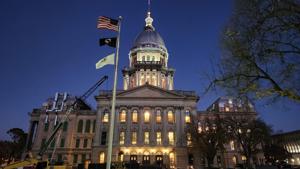If you ever wonder why the Illinois General Assembly never fixes Illinois’ property taxes, pension debt or other big issues – even with supermajorities in both chambers – you need look no farther than this past session and the lawmakers’ stats.
They introduced 6,745 bills during the legislative session that ran from January until May 31. Of those, 3,859 clever lawmaker ideas came with costs because they changed how the state operates. Those taxpayer liabilities were all but unknown because lawmakers only bothered to ask for the price tags on 10 of those bills.
The legislative grist mill only spit out 416 of those bills for Gov. J.B. Pritzker to sign into law. Of those, just one included the projected cost to taxpayers, known as a fiscal note.
Have you ever done anything without worrying about the cost? How about doing 416 things in six months without figuring out whether you had the cash? How about making decisions on nearly 100 of those 416 things in the final 24 hours? Lawmakers do, and it is at the heart of the problem.
People who act that way in real life are usually found in federal bankruptcy or criminal court. Too often they’ve taken someone else’s money – Girl Scout cookie cash, collection plate funds or an employer’s money – to keep their addictions fed.
Illinois politicians do those things. They take other people’s money: in this case it’s yours. Addictions: in this case spending to satisfy their latest whim or ingratiate themselves to a special interest.
Responsible adults save for the future and for a rainy day. Illinois’ future has a $143.7 billion hole in what it must pay retired government workers. Its rainy-day fund has enough to operate the state for 15 days – the second lowest in the nation and a fraction of what experts recommend.
Plus, the record $55.2 billion state budget that started July 1 shorts the rainy-day fund by $45 million as one of the gimmicks used to call it “balanced.” It imposes $700 million in new taxes that were euphemistically labeled “smart new sources of revenue.”
They dawdle for months and on the final day rush through nearly 100 bills. The $55.2 billion budget itself came at the last minute, using sleight-of-hand to get around the Illinois Constitution’s dictate that all bills be read on three separate days. The rule is intended to ensure lawmakers know what they are voting on and that taxpayers have a chance to be heard.
Smoke-filled backroom deals in the state capitol prevent that. Lawmakers gut other bills that meet the three-day reading requirement and replace everything with thousands of pages of spending, all to prevent debate and scrutiny.
Lawmakers kept busy, but not in ways that help Joan Q. Public. They set a new spending record as part of the $15 billion boom since Pritzker took office. They gave themselves $6,000 raises. They brought home $237 million in pork: $3 million per state senator, $1.5 million per state representative – but the Democratic supermajorities only gave themselves money and cut out 1 in 3 taxpayers represented by a Republican.
They also fretted over these pressing topics: a commission to design new “I voted” stickers, making state agency forms gender inclusive, protecting felony prostitution records, keeping grocery coupons on paper, recycling carpets from dead people’s homes, ensuring free birth certificates for those under a guardian’s care, mandating climate change be taught in schools, providing court translators for at least 13 languages, capping insulin costs, catheter care in assisted living facilities, registering 15-year-olds to vote and banning Statehouse votes in the wee hours when lawmakers should be getting their rest.
Here’s a challenge: Can you figure out which of those bills passed and which ones died? They passed gender inclusion, prostitution records, climate education, insulin costs, catheter care and court translators.
They do this year after year: tinkering at length with minor matters and ignoring the tough work that would truly help our state.
Illinoisans face the No. 1 state and local tax burden. Our property taxes are double the national average. We have higher unemployment and are seeing working-age people move away. We educate our youth for at least 12 years only to see them attend colleges in other states and then stay to contribute to those states’ economies and tax bases.
Governing can be darned hard work filled with unpopular decisions. It involves saying “no” and sacrificing now for a better future and focusing on the important rather than fluffy distractions.
Illinois needs pension reform, fiscal discipline and tax cuts. We don’t need new “I voted” stickers.





